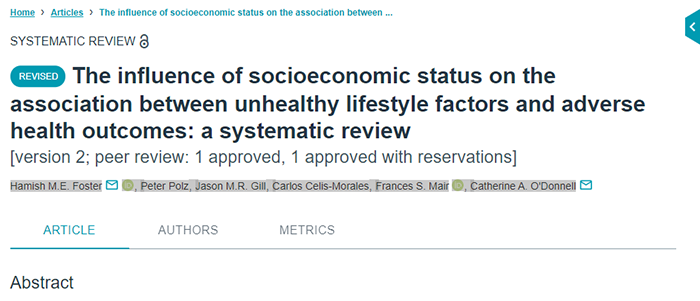New Article Led by Hamish Foster
Published: 15 February 2024
Article with contributions from Professor Jason Gill and Dr Carlos Celis-Morales
The influence of socioeconomic status on the association between unhealthy lifestyle factors and adverse health outcomes: a systematic review
Hamish M.E. Foster, Peter Polz, Jason M.R. Gill, Carlos Celis-Morales, Frances S. Mair, Catherine A. O'Donnell

Summary
Combinations of lifestyle factors and socioeconomic status (SES) are independently associated with adverse health outcomes and less advantaged populations may be disproportionately vulnerable to unhealthy lifestyles. However, interactions between lifestyle and SES are poorly understood. We systematically reviewed and synthesised literature that reported data on whether and how SES affects the relationship between combinations of lifestyle factors and adverse health outcomes. We included prospective cohort studies that 1) examined associations between at least 3 ‘behavioural’ lifestyle factors (e.g., smoking/physical activity) in combination and all-cause mortality or CVD/cancer mortality/incidence and 2) reported data on socioeconomic (e.g. income or deprivation index) influences on those associations. We found six studies (n=42,467–399,537; 46.5–56.8 years old; 54.6–59.3% women) of five cohorts. All-cause mortality was examined in all studies; three studies assessed CVD/cancer outcomes. In analyses stratified by socioeconomic measures, all-cause mortality HRs (95% CI) for unhealthiest versus healthiest lifestyle ranged from 0.68 (0.32–1.45) to 4.17 (2.27–7.69) among the most advantaged and from 1.30 (1.13–1.50) to 4.00 (2.22–7.14) among the least advantaged. In analyses of the combined association between lifestyle factor combination, SES, and all-cause mortality, the highest risk of all-cause mortality was observed in the unhealthiest lifestyle-least advantaged group suggesting an additive effect. Overall, the literature was limited and heterogenous but the suggestion of an additive influence of SES on associations between combinations of unhealthy lifestyle factors and adverse health supports arguments to target lifestyle support to less advantaged populations. More analyses are needed to clarify whether SES modifies lifestyle-health outcome associations.
First published: 15 February 2024

